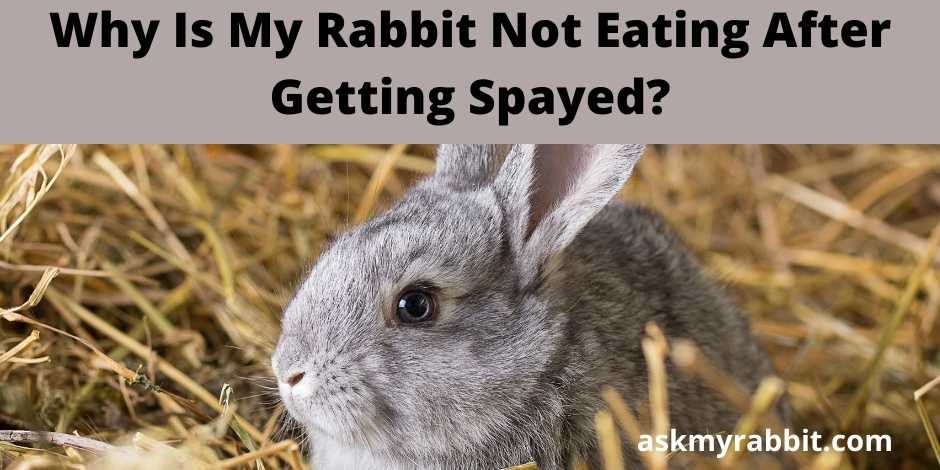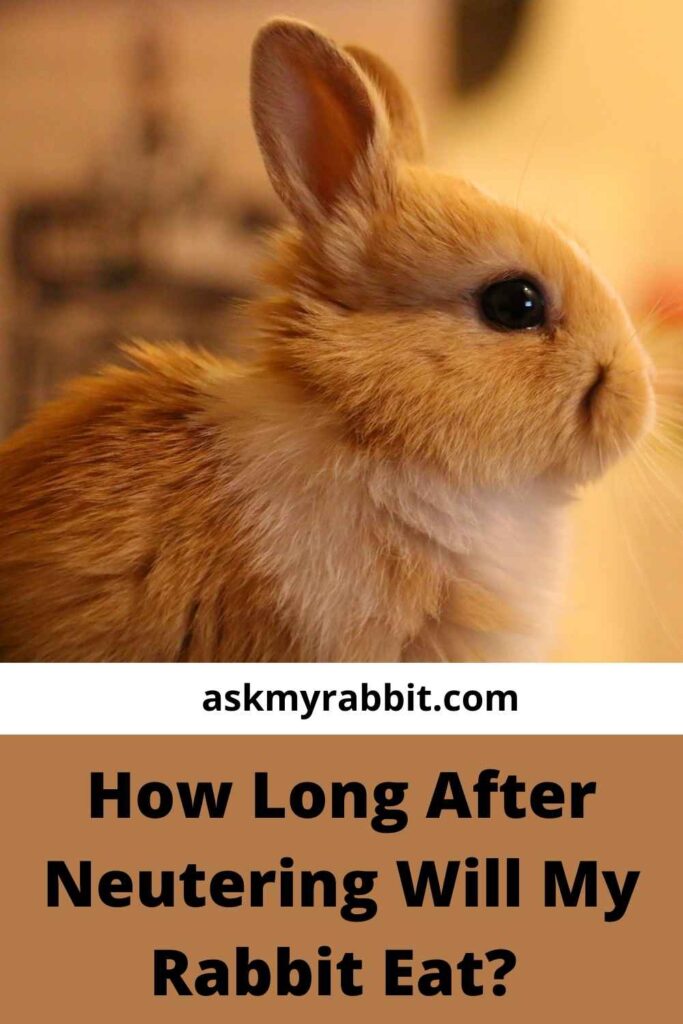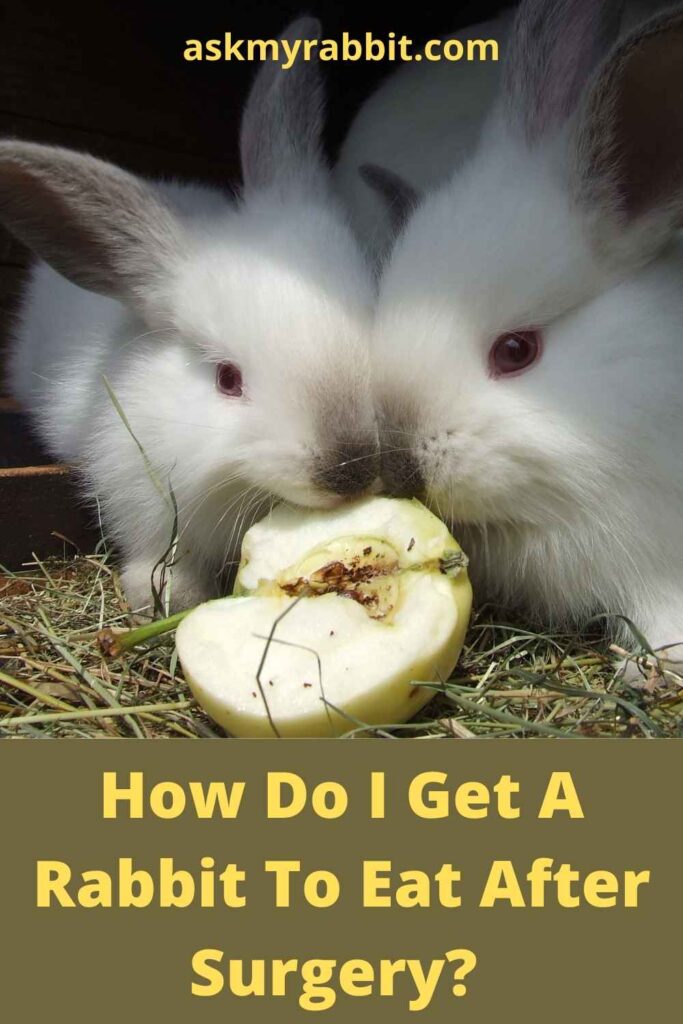Both you and your rabbit will benefit from neutering or spaying your rabbit. Even though the procedure is typically minimal, you must ensure that your rabbit recovers fully.
Your rabbit may refuse to eat after being spayed as he is unhappy or in discomfort. As a pet owner, you must continue to encourage your bunny to eat.
To make post-operative care as simple as possible, you should plan ahead of time. Give your rabbit a pleasant and secure environment as soon as you get home.
A bunny’s recovery following surgery usually takes ten days. Throughout that period, you must offer the necessary medical care.
In this article, we will inform you all about caring for your rabbit after he gets spayed. So, keep reading!

Why Is My Bunny Not Eating After Getting Neutered?
Your bunny might not be eating after getting neutered as he is uncomfortable or in pain. Contact your veterinarian if your rabbit hasn’t eaten anything within twenty-four hours following surgery.
Keep a watchful eye on your bunny’s fecal pellet production. If fecal production slows or stops for more than thirty-six hours after surgery, your rabbit may have ileus.
Ileus is a rare but significant post-surgical consequence in bunnies.
How Long Can A Rabbit Go Without Eating After Surgery?

To avoid a digestive system shutdown, it’s best to start a rabbit eating as soon as possible after most procedures. When you arrive home, make sure your bunny gets fresh vegetables, hay, and pellets.
You should frequently provide alfalfa since it is a high-fiber, high-calorie treat that may persuade a hesitant rabbit to eat. Rabbits that start feeding right after surgery generally recover the fastest.
A rabbit can go without eating after surgery for twenty-four hours. It’s possible that your rabbit won’t be able to resume her usual feeding patterns for many days. This is okay as long as some meal is consumed within twenty-four hours.
If your rabbit hasn’t eaten anything the day after surgery, you’ll need to contact a veterinarian. You will also need to start force-feeding your bunny.
There are numerous products available that are created as a comprehensive balanced diet for force-feeding. If syringe feeding is essential, you may wish to get this.
Even though your rabbit generally drinks from a bottle, provide a dish of water. It’s critical that your rabbit rehydrates after surgery. We recommend that you use a dish rather than from a bottle since it requires less effort.
How Long After Neutering Will My Rabbit Eat?
Your rabbit should start eating as soon as possible after surgery. You should ideally feed him within twenty-four hours of neutering.
Fresh water, hay, vegetables, and pellets should all be available. Keep an eye on your food and water intake. Consult your veterinarian if normal eating and drinking habits do not return within twenty-four hours.
When you go home, put your rabbit in a quiet, warm place. Keep your rabbit together if he is part of a bonded couple or a group.
Being with your rabbit during recuperation should be reassuring to him. It may also help him relax and recuperate faster.
The first night following surgery, try not to handle your rabbit too much. She’ll love having a peaceful place to relax without being disturbed.
She should resume her usual routine three or four days after surgery. This will also include her typical activity, eating, and contact with you. For the first ten days, exercise should be kept to a minimum.
Keep an eye on your rabbit’s feces. Within a day or two, output should be back to normal. If your feces production slows or stops, call your veterinarian straight away.
Rabbits heal rapidly following spay surgery and may frequently resume regular activity within a few days. Males often heal faster from neuter surgery than females do following spay operation.
It’s critical to wait thirty days following surgery before introducing your rabbit to other bunnies. After neutering, males may have viable sperm for up as thirty days.
How Do I Get A Rabbit To Eat After Surgery?

Many rabbits may need surgery at some point throughout their lives, such as neutering or treatment for an illness. Most rabbit surgeries are now quite safe.
However, the outcome of treatment and recovery is still dependent on the quality of care provided by the owner before and after the surgery.
Keep your rabbit comfortable while it travels back to its home. Bring your rabbit’s hutch inside and put it in a warm, quiet area if it lives outside.
Replace any sawdust/straw bedding with layers of clean newspaper in the hutch or box. To encourage your rabbit eating as quickly as possible, provide water and appealing food. This may include fresh greens and carrots.
In order to get your rabbit to eat after surgery, tempting items such as carrots, fresh herbs, or newly plucked grass should be available. Female rabbits are normally silent for the evening after neutering and may refuse to eat. Males recover faster than females since their operations are shorter.
Allow at least twenty-four hours for your rabbit to be inside. It’s best if you keep it calm since any abrupt movements might tear the sutures.
To keep your pet comfortable and avoid infection, your veterinarian may prescribe pain relievers, antibiotics, or other medications. Many owners find that making a chart and ticking off each dosage as it is administered keeps them from forgetting anything.
How Do I Stop My Rabbit From Pulling Out His Stitches?
Many veterinarians now utilize a form of suture that is totally buried under the skin. Hence, the stitches cannot be eaten or pulled out by rabbits.
If your rabbit tries to remove its sutures, your veterinarian may prescribe an Elizabethan collar. You may put it around your rabbit’s neck to keep it from grooming itself. Dressings may also be held in place using the leg of a pair of tights for a body procedure.
How Do I Take Care Of My Bunny After Neutering?

In order to take care of your bunny after neutering, keep an eye on your rabbit’s body language for signs of suffering. Pain might be indicated by grinding teeth, odd body positions, or diminished attentiveness. Once the effects of anesthetic have worn off, your rabbit may display these signals.
Depending on the kind of operation and your specific rabbit, some rabbits may need pain medication the days after surgery. We discovered that rabbits, like us, are unique individuals with widely varying pain thresholds.
A rabbit in discomfort is less likely to eat or drink enough. This may cause their recuperation to be slowed or severely hampered. If a rabbit is in excruciating discomfort, it may fall into shock and die.
Until your rabbit’s food and water intake returns to normal, keep a constant eye on them. Consult your veterinarian if normal feeding or drinking does not resume within a few days.
Also, if your rabbit’s eating returns to normal but then decreases, contact your veterinarian right once. This might indicate an infection, a hernia, or the production of adhesions. Check the incision every day for a week, or until all non-dissolvable sutures and staples have been removed.
Any unusual redness, swelling, temperature, discharge, or odor should be reported to the doctor. You may see tiny bumps beneath the skin if intradermal sutures were utilized. These are most likely natural suture knots that will resolve over time.
If your rabbit licks excessively, the incision may need to be re-closed. Also, your doctor may need to put the rabbit under anesthetic. If intradermal sutures were not used the first time, request that they be used the next time you suture.
To avoid additional inflammation of the region, some veterinarians may employ an Elizabethan collar (e-collar). These collars are not well tolerated by rabbits, and they may refuse to feed while wearing them. You may need to remove the collar for a moment to allow your rabbit to feed, in which case you must continually observe your rabbit.
Antibiotics may have been administered by your veterinarian during surgery to prevent infection. After normal procedures, antibiotics are only given if infection or other medical issues need treatment.
Antibiotics may have a bad impact on intestinal flora when your rabbit isn’t eating correctly. This can lead to a number of issues in your bunny.
Frequently Asked Questions
Should My Rabbit Eat After Being Spayed?
If your bunny’s operation results in issues that lead him to stop eating, you may need to hand-feed him for a few days. You may have to do it till his GI system heal. Check with your veterinarian to see whether this is essential.
Will Getting My Rabbit Spayed Change Her Personality?
Spaying female rabbits is critical for their wellbeing. Your rabbit’s core nature will not alter as a result of spaying. She will remain as kind and affectionate to you and other bunnies. However, some rabbits will continue to show territorial behavior.
What Age Should Rabbits Be Spayed?
The majority of rabbits are spayed between the ages of four and six months. Many veterinarians recommend spaying at the age of six months.
Final Words
Rabbits are quick healers, and after just a day or two, they may behave and feel normal again. However, if your rabbit has had stomach surgery, it is a good idea to confine him for up to a week to avoid excessive running and leaping. Internal tissues need sufficient time to recover.
The majority of rabbits will not have any difficulties as a result of surgery if they are treated by a qualified rabbit veterinarian. Knowing how to prepare your rabbit for surgery and what to do for post-surgical care ensures that your rabbit has the greatest chance of a smooth recovery.
Drop down your doubts and queries regarding your furry bunny friend in the comment section below. We will answer them soon!







